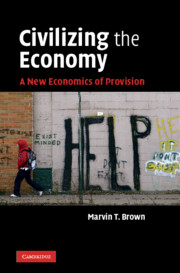Book contents
- Frontmatter
- Contents
- List of figures
- List of tables
- Preface
- 1 Introduction: creating a just and sustainable economy
- Part I Creating a new economic framework
- 2 Adam Smith's silence and an economics of property
- 3 Reclaiming the notions of provision and family
- 4 Making provisions in a dangerous world
- Part II The civic option
- Part III A civic view of labor, land, and money
- Part IV Civilizing economic systems
- Part V A civic agenda
- Appendix: Free enterprise and the economics of slavery
- Bibliography
- Index
3 - Reclaiming the notions of provision and family
Published online by Cambridge University Press: 05 June 2012
- Frontmatter
- Contents
- List of figures
- List of tables
- Preface
- 1 Introduction: creating a just and sustainable economy
- Part I Creating a new economic framework
- 2 Adam Smith's silence and an economics of property
- 3 Reclaiming the notions of provision and family
- 4 Making provisions in a dangerous world
- Part II The civic option
- Part III A civic view of labor, land, and money
- Part IV Civilizing economic systems
- Part V A civic agenda
- Appendix: Free enterprise and the economics of slavery
- Bibliography
- Index
Summary
We need an economy that recognizes and includes the living providers of wealth instead of one that ignores them or treats them as nothing but property. We need an economics that recognizes the ethical relationship between providers and the provided for. In our current economic framework, the ethical is largely located either in individual persons, or in relationships among persons outside of the market. Inside the market, one can trust the invisible hand, or “the miracle of the market,” to move us in the right direction. The relationships of supply and demand, in other words, are not seen as moral relations, but as property relations. As long as we interpret persons and the planet as property, we will continue to lose valuable time that we need to redirect our economy toward a just and sustainable future.
This chapter attempts to restore the ethical dimension of economics or, more precisely, to change our thinking so that economics and ethics belong together. There are several ways to do this. In this chapter we will restore the human dimension of the relationship between providers and the provided. We will then turn to restoring the family and community as the center of economic action instead of the individual entrepreneur or “economic man” of our current property-based economics.
In the tradition of an economics of property, economic action is the effort of the isolated individual or economic man, who acts on his self-interest or preferences and tries to maximize his good fortune.
- Type
- Chapter
- Information
- Civilizing the EconomyA New Economics of Provision, pp. 34 - 44Publisher: Cambridge University PressPrint publication year: 2010



